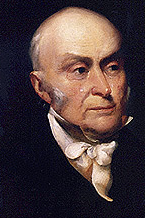The Founding Fathers and Slavery.
Posted By Cliff Tuttle | June 30, 2011
No. 641
So, Michelle Bachman is being called a non-leader by some for making a statement that the Founding Fathers worked tirelessly to abolish slavery. When pressed about it, the only example that she could come up with was John Quincy Adams. Whereupon, she drew a certain measure of ridicule from members of the press who declared John Quincy not to be a Founding Father. These critics, Who were apparently all political and not historical writers, were willing to admit that JQA worked to abolish slavery.
The question whether JQA was a Founding Father is a matter of definition. He was, after all, only a teen-ager, but was undoubtedly present during the American Revolution. Perhaps he could have been better described as a founding son. Nevertheless, he was sufficiently educated and experienced to be appointed as Ambassador to the Netherlands by President George Washington. Perhaps serving in the Washington administration qualifies him as a founder. He was the last President of the generation that participated in the Revolution.
It might be more correct to say that some of the Founding Fathers opposed slavery and a few of them worked for its abolition. Their efforts helped create the famous deadlock and compromise in the Constitutional Convention that saw slave trade abolished in 1808, the year before the birth of Abraham Lincoln. It also saw 3/5 of slaves established for purposes of computing representation in the House of Representatives.
Perhaps, the most eminent opponent of slavery among the Founding Fathers was, yes, Benjamin Franklin. The Center for Legislative Archives, which has the Petition from the Pennsylvania Society for the Abolition of Slavery signed by Franklin in its collection, states:
It was after the ratification of the United States Constitution that he became an outspoken opponent of slavery. In 1789 he wrote and published several essays supporting the abolition of slavery and his last public act was to send to Congress a petition on behalf of the Society asking for the abolition of slavery and an end to the slave trade. The petition, signed on February 3, 1790, asked the first Congress, then meeting in New York City, to “devise means for removing the Inconsistency from the Character of the American People,” and to “promote mercy and justice toward this distressed Race.”
Then there was Alexander Hamilton. As James Oliver Horton wrote in The New York Journal of American History:
Although Hamilton did not live to see it, slavery’s demise in New York was to some extent his doing, having been motivated in part by the environment of his youth. He was one of those who refused to ignore the illogic, the irreligious, the hypocritical racial distinction that many of his friends and associates in Revolutionary America were willing to make. He publicly condemned Americans who demanded freedom for themselves as a God-given right, while depriving others of freedom and profiting from that deprivation.
Hamilton, along with another Founding Father, John Jay, was a leading member of the New York Society for the Manumission of Slaves.
CLT
Note: John Quincy Adams, Alexander Hamilton and John Jay were lawyers. Adams practiced law in Boston. Hamilton practiced law in New York. John Jay was the first Chief Justice of the United States. In addition to being great Americans, they are great lawyers.




